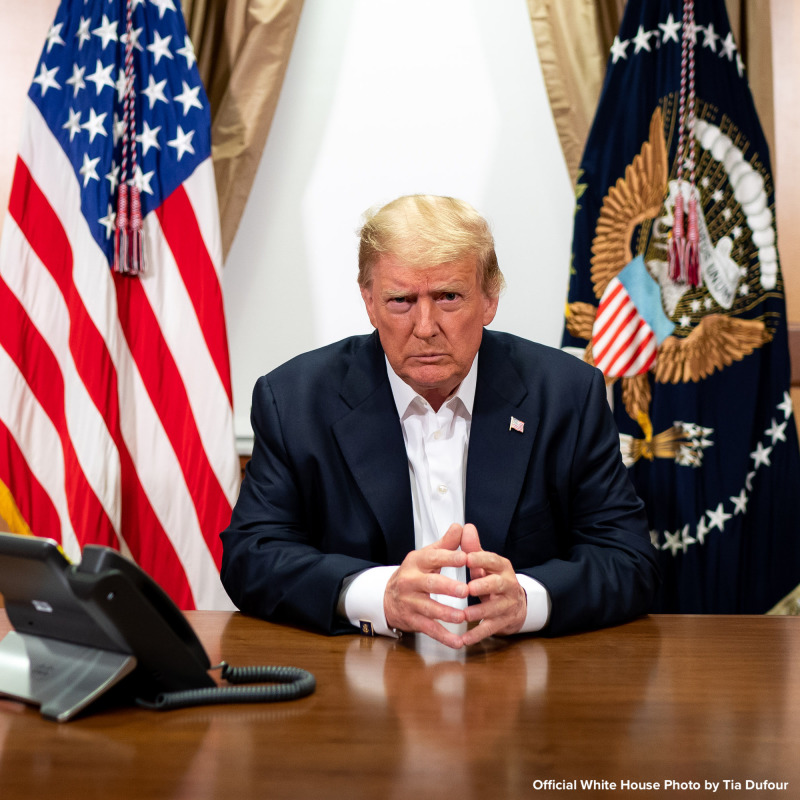
In an interview with Fox News on Friday, Dr. Scott Atlas, a neuroradiologist and health policy adviser to President Trump on coronavirus, said he expects the president and first lady to make a "complete, full and rapid recovery", adding that, "there is zero reason to panic." On Sunday, physicians attending to the president confirmed that the president is recovering strongly and said they hope they "can plan for a discharge as early as tomorrow."
Dr. Atlas, also a senior fellow at the conservative Hoover Institution of Stanford, stated during the interview that the virus "is very difficult to avoid," stressing that the President and First Lady's positive test results "change nothing" about what is known about the disease.
"He is a very, very healthy guy," Atlas said, referring to President Trump. "And the overwhelming majority of people, even at his age, do fine with this. He is very healthy, and so I anticipate the same for him."
Atlas also provided an encouraging outlook on the First Lady, saying, "she is not a high-risk person at all and I anticipate she will do perfectly well."
"There is zero reason to panic," Atlas said. "There is nothing different here. The president and his wife are human beings."
Atlas was added to the White House Coronavirus Task Force in August by President Trump and shares many of Trump's views on the virus. Allies of President Trump, such as Rudy Giuliani and Rush Limbaugh have supported Atlas' addition to the Task Force. Limbaugh referred to Atlas as "countering Fauci" on his radio show in August.
"This is a widespread, highly contagious infection, and this is going to be very mild or asymptomatic for the overwhelming majority of people, especially if you're a healthy person," Atlas explained during the interview with Fox News. "And if you can, do your best at the usual mitigation - hand washing, social distancing, the usual masks, if you are in very tight spaces and you cannot socially distance, or are with high-risk family members."
Atlas' views had been influential for the administration even before his addition to the Task Force. Press Secretary Kayleigh McEnany quoted Atlas during three Task Force briefings in July and August, most often on his remarks that lockdowns prevent cancer patients from getting treatment. According to a report by Politico, Atlas has argued against increasing testing capacity during private Task Force meetings. He has also been an outspoken supporter of a "herd immunity" approach and is in favor of reopening schools and ending lockdowns.
Atlas reiterated his position in the interview Friday: "This is a disease that spreads, we anticipate that people get this infection, and it does not go away by isolating or locking down."
"We know the severe harms of locking down with prolonged isolation and prolonged closures of schools and businesses, and nothing has changed about the message-which is, this is a widespread infection, the vast majority of people do well, we need to protect the highest risk people and open schools up and society and get back to functioning," Atlas said.
He added: "We are all highly optimistic at the White House."
Trump tested positive for Covid-19 on Thursday evening and announced his and the First Lady's positive diagnosis on Twitter on Friday around 1am.
A burgeoning outbreak has surrounded the president's diagnosis, as multiple ranking GOP members of the Senate Judiciary Committee, White House aides, team members on the president's debate preparation team, as well as the president's campaign manager, RNC chairwoman Ronna McDaniel, counselor Kellyanne Conway and her daughter, and head of Oval Office operations Nick Luna have all tested positive for the virus.
According to the New York Times, Ms. Hicks, a senior adviser, began feeling symptoms related to the virus at a campaign event in Duluth, Minn. Ms. Hicks was then isolated at the back of Air Force One on the return trip. The news that she had tested positive came on Thursday around 1 p.m. as Trump left the White House for a fundraiser at his golf club in Bedminster, N.J.
Trump attended three events at the fundraiser and appeared before hundreds of supporters. The New York Times reported that the president was "in contact with about 100 people and appeared lethargic." Additionally, all three attendees contacted by CNN reported that they had not been informed of the president's exposure to Covid-19 but were officially notified on the next day, Friday, around noon.
Amid the confusion surrounding the Trump administration's handling of the flurry of positive tests during their campaign, Trump White House officials have maintained an exceedingly optimistic outlook on Trump's health. The administration has drawn criticism and concern for potentially misleading the public about the president's health in addition to mishandling the quarantine procedure in the days preceding Trump's diagnosis. (Axios report)
Earlier today, a multidisciplinary team of physicians, led by White House physician Dr. Sean P. Conley, gave the most recent update on the president's disease progression. The multi-institutional group of doctors provided encouraging remarks on the president's clinical condition, discussing his energy level, vital signs, and organ function. Dr. Conley provided a description of the disease progression from Thursday night to Sunday morning and answered questions from the press about President Trump's condition. All three physicians that spoke emphasized three things: 1) that the team at Walter Reed were monitoring all vital aspects of the president's health constantly, 2) that President Trump was improving rapidly and doing extremely well and 3) that it was an enormous honor to serve the president at Walter Reed.
Conley said that Trump felt only mild symptoms and had an oxygen saturation level in the high nineties on Thursday evening into Friday morning. Conley then returned late Friday morning and found that the president "had a high fever and his oxygen saturation was transiently dipping below 94 percent." Given his judgement of the symptoms and stage of the disease, Conley recommended and administered supplemental oxygen to the president.
Conley reported that "based predominantly on the timeline from the initial diagnosis" the team decided to respond to two episodes of transient drops in Trump's oxygen saturation by beginning treatment with Dexamethasone. When asked about the second episode by a member of the press, Conley replied that Trump's oxygen saturation had fallen below 93 percent on Saturday morning. According to treatment guidelines from the NIH, an oxygen saturation below 93 percent could indicate "severe illness", although it was not clear whether oxygen had been administered on Saturday.
Dr. Brian Garibaldi, Director of the Johns Hopkins Biocontainment Unit, briefed the press on the team's course of action for the day: "Today, he feels well, he's been up and around. Our plan for today is to have him to eat and drink, be up out of bed as much as possible, to be mobile. If he continues to look and feel as well as he does today, our hope is that we can plan for a discharge as early as tomorrow to the White House where he can continue his treatment course."
Garibaldi also discussed therapeutics in detail, "The president yesterday evening completed a second dose of Remdesivir, he's tolerated that infusion while we've been monitoring for any potential side effects. He has had none that we can tell. His liver and kidney function have remained normal. We continue to plan to use a five day course of Remdesivir. In response to transient low oxygen levels, as Dr. Conley has discussed, we did initiate dexamethasone therapy and he received his first dose of that yesterday. our plan is to continue that for the time being."
So far, President Trump's physicians and administration have displayed a clear sense of confidence in his speedy recovery. With the healing of God and power of prayer, President Trump has a clear path to recovery.


















